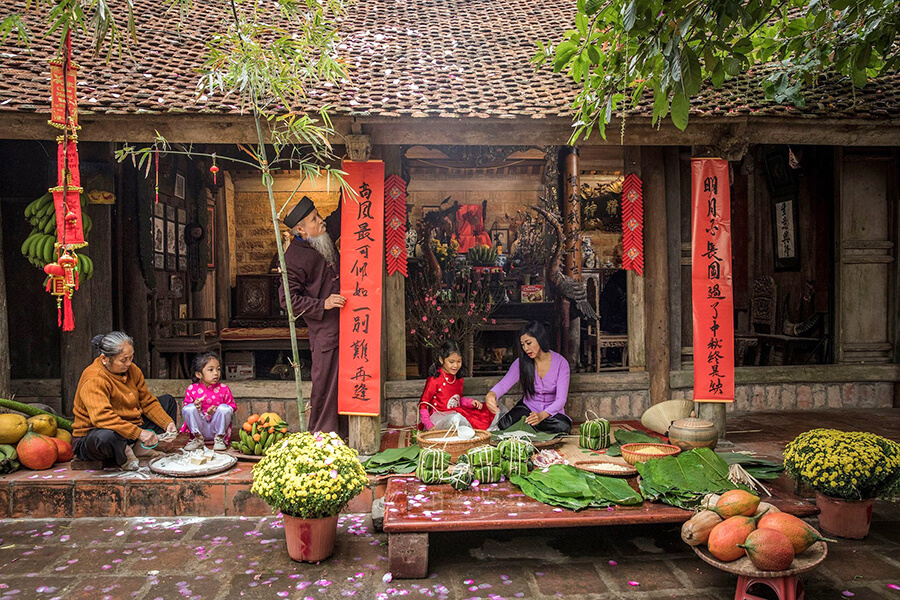Traditional Custom & Culture
Tet Holiday – Traditional Vietnamese Lunar New Year
Tet holiday – The Lunar New Year is the biggest festival among the traditional festivals of Vietnam, is the intersection between the old year and the new year, between a cycle of operation of heaven and earth, all living creatures and plants. Besides that, there is the desire for the longevity of life, the harmony of Heaven – Earth – Human, the cohesion in the community, clan and family. Lunar New Year is also an opportunity to return to the root of ancestors. It is a spiritual value, as well as a deep emotional value of the Vietnamese people, which has become a good tradition.
The Lunar New Year is one of the biggest and most important holidays of Vietnam since ancient times and it is always imbued with the cultural identity of the people in a profound and unique way.
So where does the Lunar New Year actually come from and what is the meaning of its name?
Tet is the desire of many children to wear new clothes, to eat jam and especially to receive lucky money.
Lunar New Year – also known as Tet Nguyen Dan which means “weather or turning point of the first season of the old year and new year – spring”. The two words “Nguyen Dan” have Chinese roots; “raw” means the beginning or the beginning and “dan” means early morning. Therefore, the correct phonetic transcription must be “Tet Nguyen Dan”. Lunar New Year is called by the Vietnamese with a very dear name “Tet Ta”, to distinguish it from “Western Tet” (New Year’s Day).
But there are also theories that: Vietnamese culture – belonging to wet rice agricultural civilization – due to the need for agricultural cultivation, has divided the time in a year into 24 different periods, and for each of these periods, there is a certain period of time (the turning point of time). The “first days of spring” is the most important period is the beginning of a cycle of cultivation and planting, which is the Tet – Lunar New Year.
Later, due to the remarkable development of the language, the word “Tiet” was Vietnameseized into “Tet” and formed the name of the Vietnam Lunar New Year as it is today.
What time is Lunar New Year held?
Because the Vietnamese lunar calendar is different from that of China, the Vietnamese Lunar New Year does not completely coincide with the New Year of the Chinese and other countries influenced by Chinese culture.
Because the lunar calendar is a calendar that follows the operating cycle of the moon, the Lunar New Year is later than the international New Year. Due to the rule of 3 years create a leap month of the lunar calendar, the first day of the Lunar New Year is never before January 21 of the solar calendar and after February 19 of the solar calendar, but usually falls between the end of January and the middle of February. The entire annual Lunar New Year holiday usually lasts about 7 to 8 days at the end of the old year and the first 7 days of the new year (December 23 to the end of January 7 following the Lunar calendar).
Origin of Vietnam Tet Holiday – Lunar New Year
Strongly influenced by Chinese culture during more than 1000 years of Northern domination, the Lunar New Year is also one of the cultural features introduced at that time. According to Chinese history, the origin of the Lunar New Year dates back to the reign of the Three Sovereigns and Five Emperors and varies from period to period. During the reign of the Three Sovereigns, the Xia Dynasty preferred the black color, so they chose January, which is the month of the Tiger. The Shang Dynasty liked the white color, so the Ox month – December, was the first month of the year. The Zhou Dynasty liked the red color, so the month of the Rat – November, was chosen as the month of Tet. The above-mentioned kings had a concept of the date and time of “creating heaven and earth” as follows: in the time of the Rat, there is heaven, at the hour of the Ox, there is the Earth, and at the time of the Tiger, the birth of human beings.
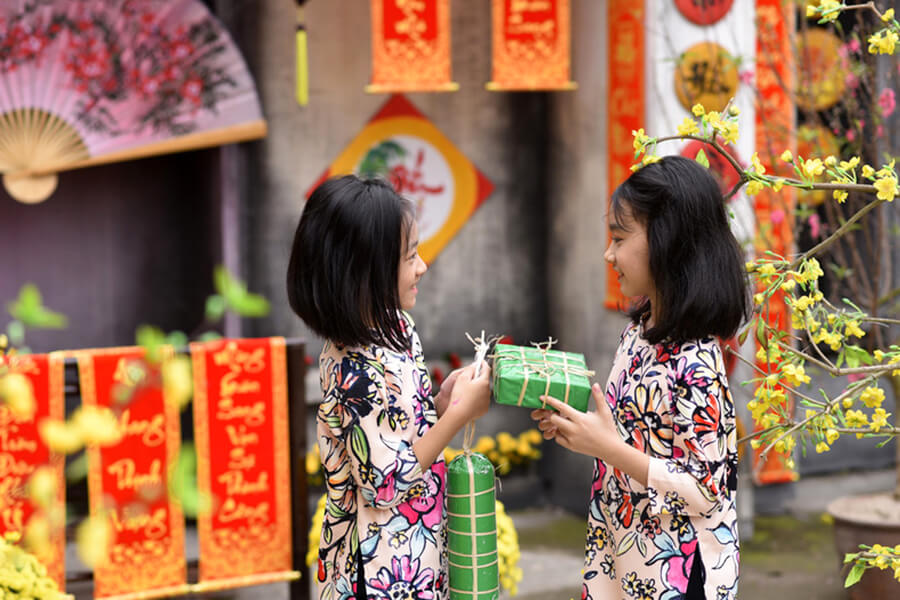
.
In the Eastern Zhou Dynasty, Confucius changed the New Year’s Day to a certain month, the Tiger. During the Qin Dynasty (3rd century BC), Qin Shi Huang changed to the month of the Pig, ie October. During the Han Dynasty, Emperor Wu (140 BC) set the New Year’s Day in the month of the Tiger, ie January. From then on, no dynasties changed about the month of the new year.
By the time of Dong Phuong Soc, he believed that on the day of creation:
on the first day, there were more chicken breeds,
on the second day, there were more dogs,
on the third day, there were pigs,
on the fourth day goats,
on the fifth-day buffaloes,
and on the sixth day horses
the seventh day gave birth to mankind,
and on the eighth-day cereals were born.
Therefore, the New Year festival is usually from the first day to the end of the seventh day.
Meaning of Lunar New Year
The Lunar New Year not only shows the communion between heaven and earth, humans and gods in the concept of Eastern people. But the most sacred is that the reunion day of all families. Whenever Tet comes, no matter what job you do, wherever you are, you want to come back to reunite under the family home for at least 3 days of Tet, to pray in front of the ancestral altar, to visit the worshiping house, the temple. graves, wells, yards,… and relived with fond memories of beloved childhood. “Going home to celebrate Tet”, is not an ordinary concept of going or returning, but a pilgrimage to the origin, where the umbilical cord is buried.
The Lunar New Year with a profound and sacred meaning is solemnly saying goodbye to the old year, welcoming and congratulating the new year for better human health, better livelihoods, and more sustainable personal and family happiness that starting from the ideology of agriculture, then gradually spreading in the life of the whole society, but still has a good humanistic meaning.
Vietnamese people think that the Lunar New Year is an opportunity to express the principle of “Drink water, remember the source” in the most profound and specific way. The value towards the origin is the spiritual value, as well as the emotional value of Vietnamese people with the Lunar New Year. This value has become a good and sustainable traditional way of life.
It is believed that, on the occasion of the Lunar New Year, ancestors will also be present on the ancestors’ altar, at their worshiping place to witness the sincerity of their descendants, and the ancestor will bless their children and grandchildren to be healthy, happy, livelihoods stably and live happily in the love between grandparents, parents, children, and spouses. That is the spiritual meaning of the Tet Holiday.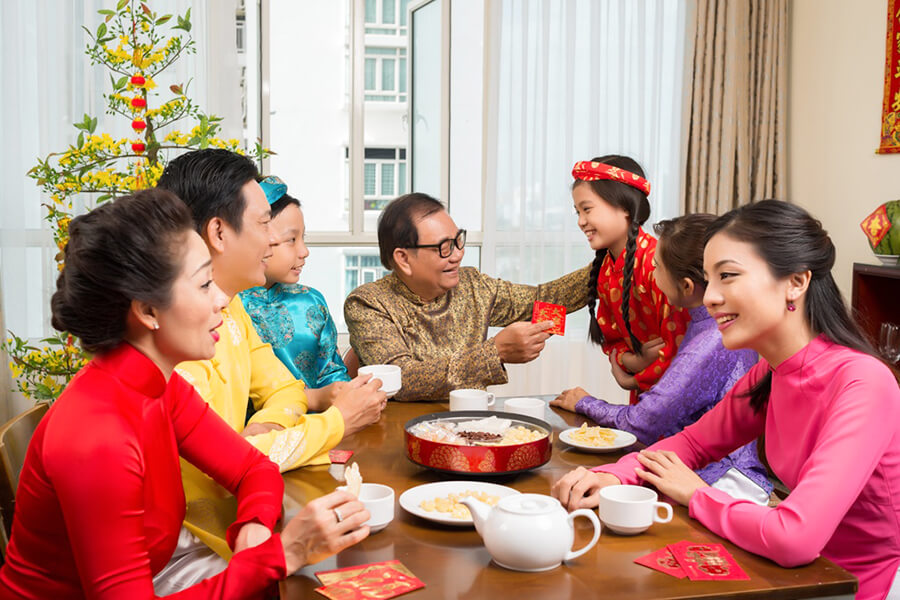
When lighting incense sticks and making offerings to ancestors during the Tet New Year, Vietnamese people feel satisfied and secure in the next life when entering the new year.
When Tet comes, Vietnamese people prepare all living conditions fully following the tradition & custom. For example, eating must be delicious, nutritious, different from normal days. Dress must be beautiful at all ages and all genders: male or female, farmer, worker, scholar or dignitary, old woman or old man.
Everyone feels like they have to get closer, say nice things with selective words and moves. For example, say nice words to each other with health, age (longevity), wish “doing good business”…
There are some exaggerations, but still pleasant and sincere. Therefore, when Tet comes, people are happy, gentle, and it is an opportunity to reconcile disagreements.
That is the moral value and aesthetic values that Vietnamese people want to achieve during the traditional Tet holiday. Therefore, the days during the Lunar New Year are really fun and happy days for everyone.
The customs and habits of Vietnamese people during the Lunar New Year
During the Lunar New Year, Vietnamese people have many interesting and meaningful customs and habits that show their own cultural characteristics.
The most prominent customs and traditions include:
Praying to Gods & Goddess of Kitchen
According to Vietnamese tradition, on the 23rd day of the 12th lunar month, families will celebrate the farewell ceremony for Gods & Goddess of Kitchen. They leave home and fly to heaven to report everything in the owner’s house to the Jade Emperor. On this day, people often clean the kitchen, prepare a full tray of offerings and buy goldfish to offer to see off kitchen gods and goddess to heaven.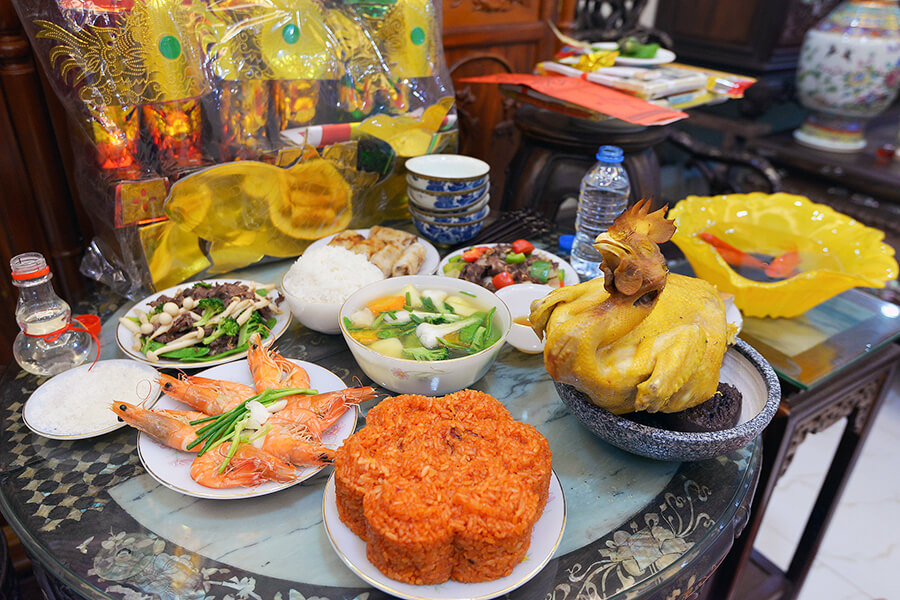
Market in the days of the year
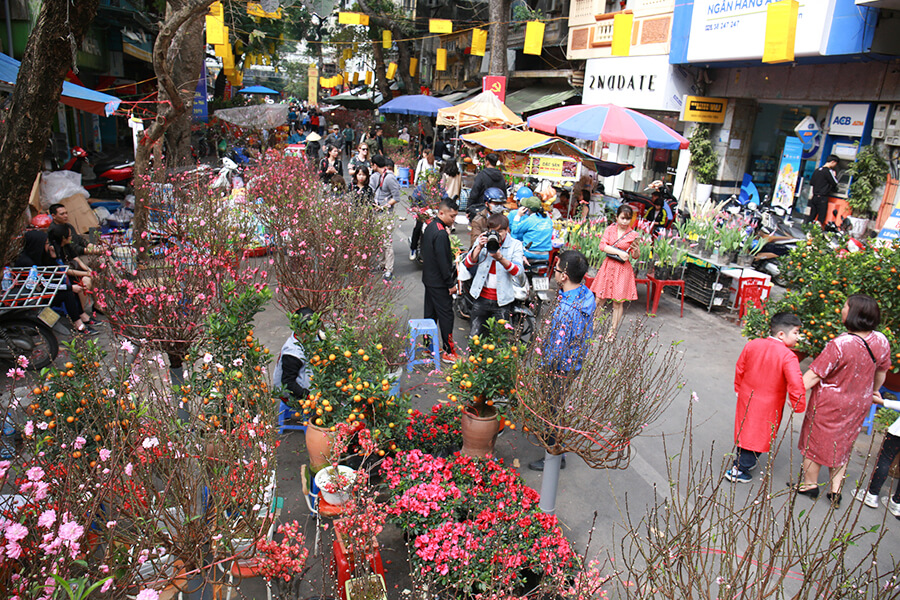
Make Chung cake & Tet cake
Banh chung, banh tet are traditional dishes indispensable during the Vietnamese Lunar New Year and also a meaningful gift for relatives and friends. Therefore, few days before Tet, many families, clans, and villages often gather together to talk, pack the cakes, and boil cakes all night.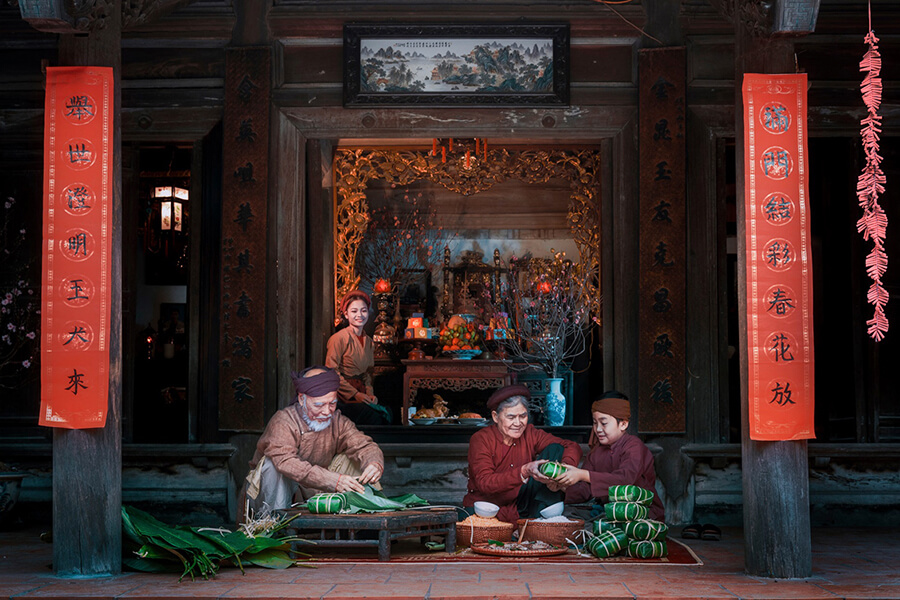
Clean the house
In the last days of the year, families in Vietnam clean and sanitize their houses and objects. This activity is not only to redecorate the house for Tet, but it also means to rearrange the things that are not right, to remove the bad things of the old year, to prepare to welcome the new year with lots of fortune and good luck.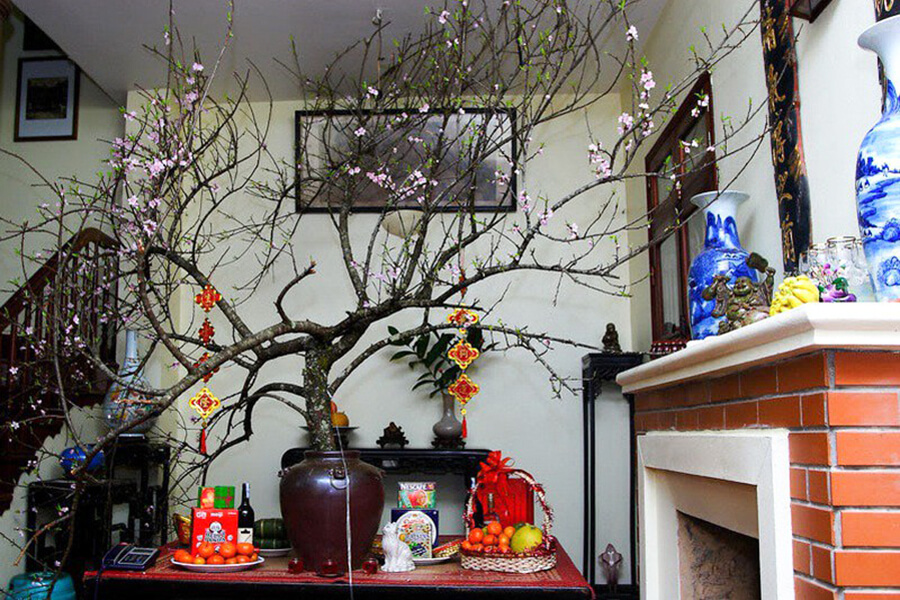
Fruit tray decoration
The five-fruit tray placed on the ancestral altar is an indispensable cultural beauty in the Vietnamese New Year. Each region will have different ways of displaying the five-fruit tray, using different fruits, but the common meaning is to wish for a new year of peace, luck, happiness, well-being and wealth.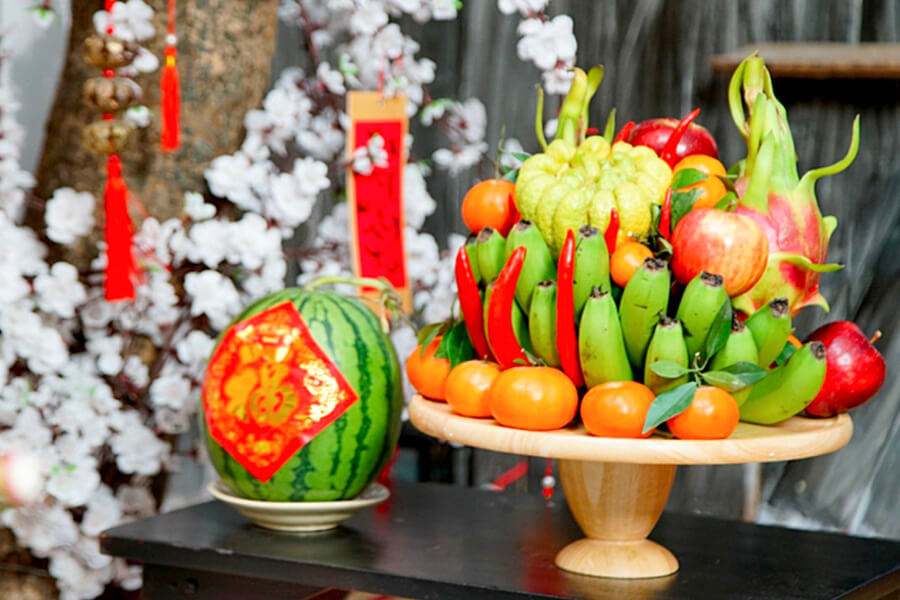
Visiting ancestors’ graves
During the Tet holiday, all the family members will also visit and clean the resting place of their ancestors and relatives together. This is a common custom of the Vietnamese people, showing filial piety and respect for their parents and deceased ancestors.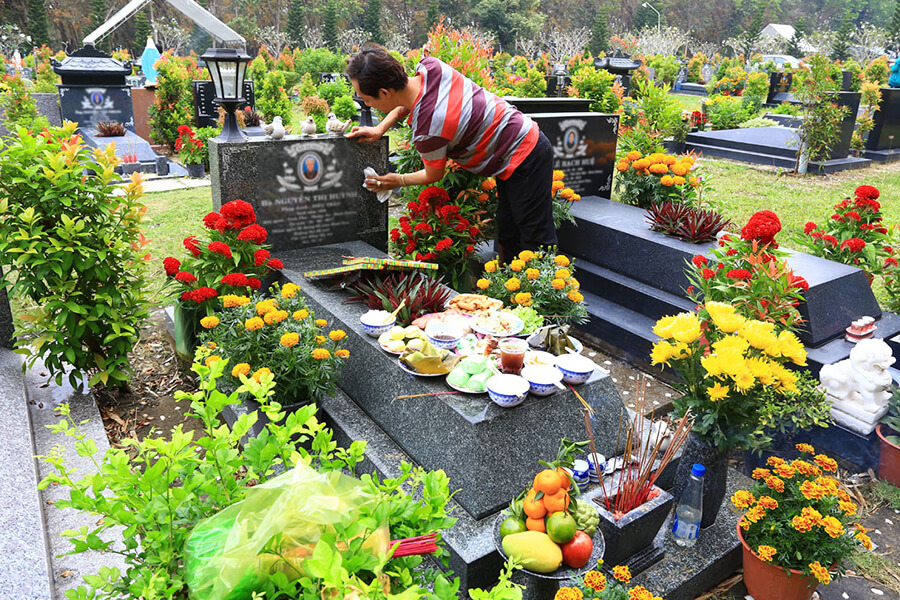
Year-end offerings
Lunar New Year’s Eve offering is also an extremely important ritual, not to be missed during the Vietnamese New Year. On the last day of the old year, families often make decent dishes and burning incense to invite gods and ancestors to celebrate Tet with their families and farewell an old year, and prepare to welcome the new year.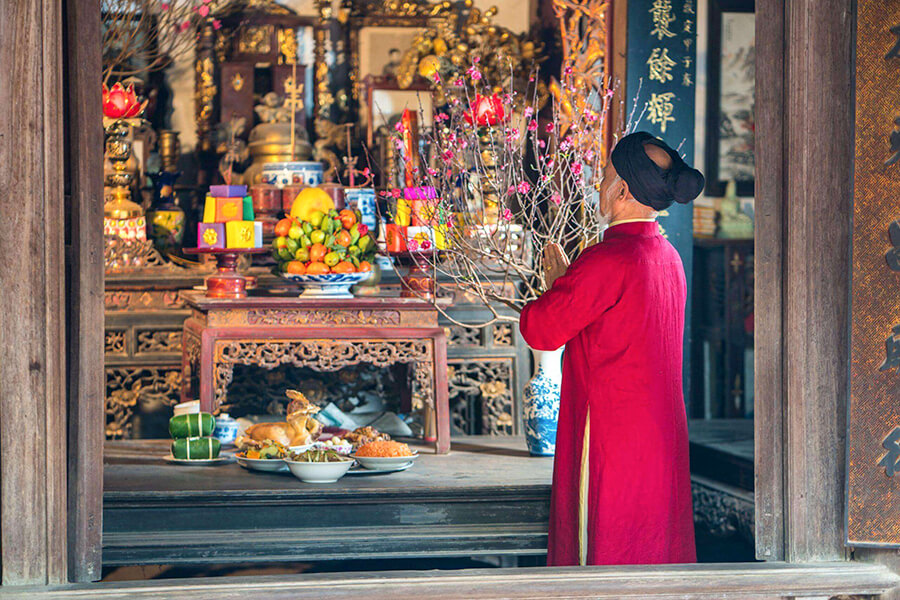
New Year’s Eve
New Year’s Eve is the moment that many people look forward to during Tet. This is the time of transition between the old year and the new year, also the moment when heaven and earth, nature and people become closest. On New Year’s Eve, there are often many interesting activities such as singing and dancing, fireworks, going to pagodas, picking lucky buds …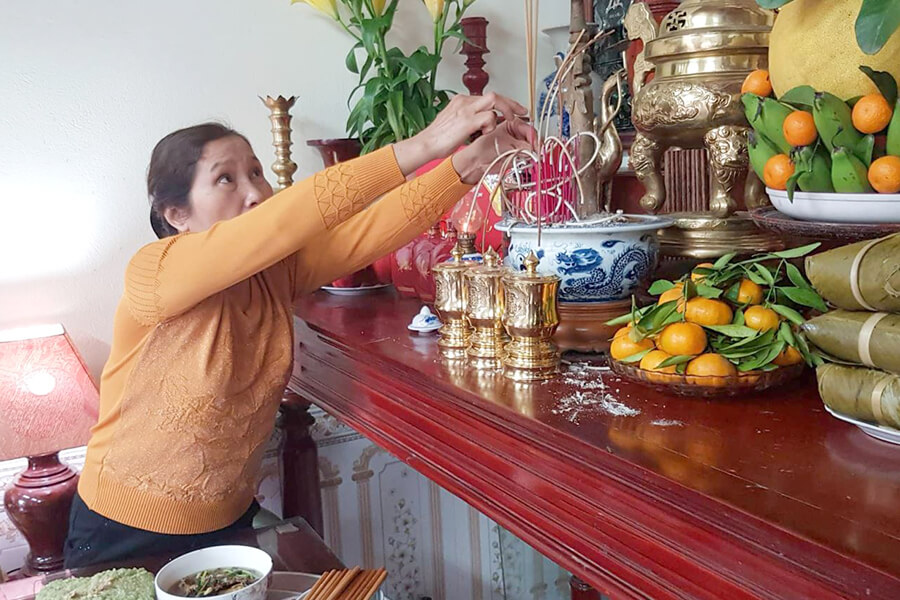
Visit the temple or pagoda, picking lucky buds
Going to the temple and picking lucky buds are indispensable activities during the Lunar New Year. Going to the temple at the beginning of the year is not only to pray for a new year of luck and fortune but also to show respect to Buddha and ancestors. On New Year’s Eve, when going to the temple, people often combine picking luck to pray for good luck and bring fortune into the house.
First Person Bring a Year of Prosperity
After the time of New Year’s Eve, welcome the new year, whoever is the first to enter the house with New Year’s greetings is the one who brings a year of prosperity. According to the Vietnamese concept, the first person who visits at the beginning of the year is very important, so families often choose people who are suitable for their age, gentle, happy family, prosperous business, happy temperament to visit their home firstly…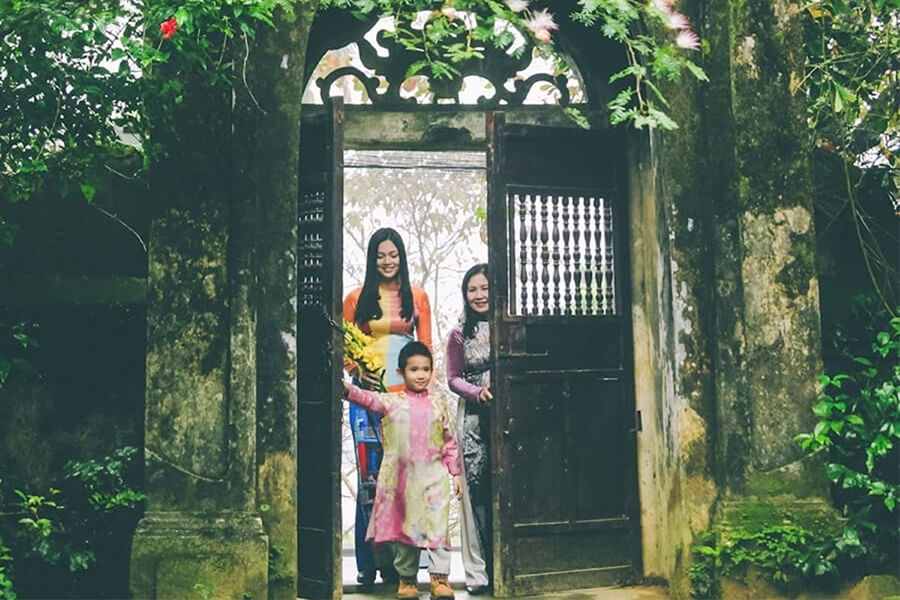
Happy New Year, Happy age with lucky money
Tet holiday is very important to children waiting eagerly for the bright red envelopes called lucky money. New Year’s greetings and celebrating are indispensable activities in the first days of the new year. Usually, on the first days of the new year, children and grandchildren in the family will gather together to wish their parents and grandparents a long life. After that, adults will celebrate their children’s new age with red envelopes for good luck and wish them to study well and be happy in the new year.
First Direction to Departure in the New Year
On the first day of the Lunar New Year, Vietnamese people often choose a beautiful time, a beautiful direction suitable for their age to depart in the hope of having good luck every time they leave the house.
Hopefully, this useful information will help you understand more about Vietnamese customs and habits during the New year festival and from there you can prepare for an upcoming holiday season.
| Year | Vietnamese Lunar New Year Date | Vietnamese Zodiac Signs |
| 2000 | 2000-02-05 | Dragon |
| 2001 | 2001-01-24 | Snake |
| 2002 | 2002-02-12 | Horse |
| 2003 | 2003-02-01 | Goat |
| 2004 | 2004-01-22 | Monkey |
| 2005 | 2005-02-09 | Chicken |
| 2006 | 2006-01-29 | Dog |
| 2007 | 2007-02-18 | Pig |
| 2008 | 2008-02-07 | Rat |
| 2009 | 2009-01-26 | Buffalo |
| 2010 | 2010-02-14 | Tiger |
| 2011 | 2011-02-03 | Cat |
| 2012 | 2012-01-23 | Dragon |
| 2013 | 2013-02-10 | Snake |
| 2014 | 2014-01-31 | Horse |
| 2015 | 2015-02-19 | Goat |
| 2016 | 2016-02-08 | Monkey |
| 2017 | 2017-01-28 | Chicken |
| 2018 | 2018-02-16 | Dog |
| 2019 | 2019-02-05 | Pig |
| 2020 | 2020-01-25 | Rat |
| 2021 | 2021-02-12 | Buffalo |
| 2022 | 2022-02-01 | Tiger |
| 2023 | 2023-01-22 | Cat |
| 2024 | 2024-02-10 | Dragon |
| 2025 | 2025-01-29 | Snake |
| 2026 | 2026-02-17 | Horse |
| 2027 | 2027-02-06 | Goat |
| 2028 | 2028-01-26 | Monkey |
| 2029 | 2029-02-13 | Chicken |
| 2030 | 2030-02-03 | Dog |
